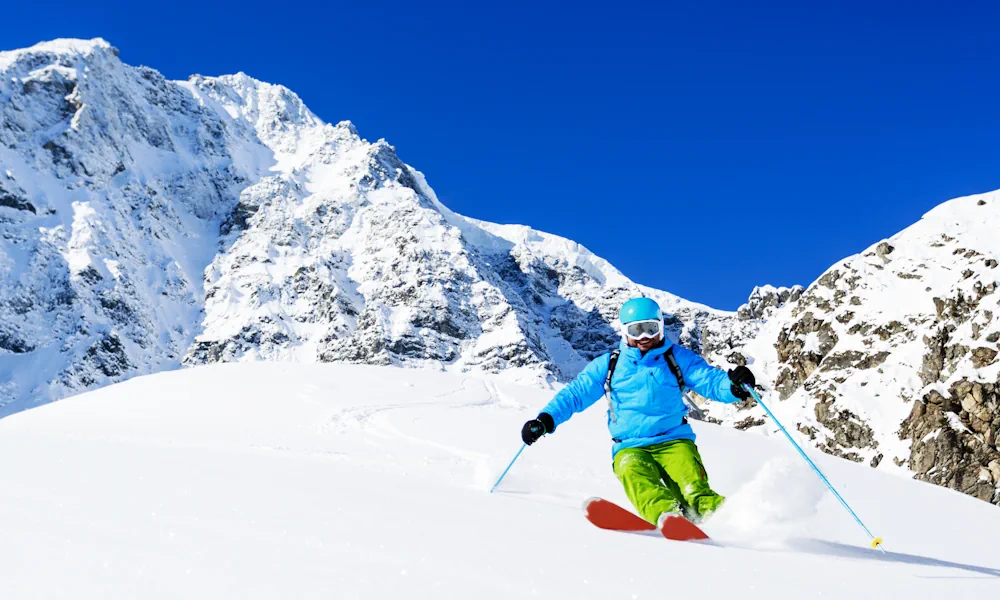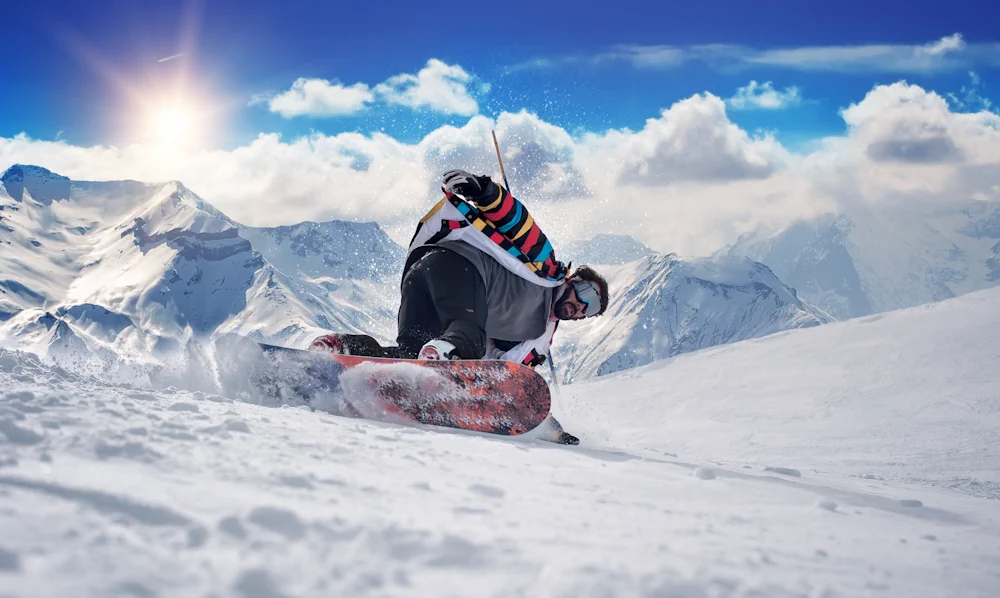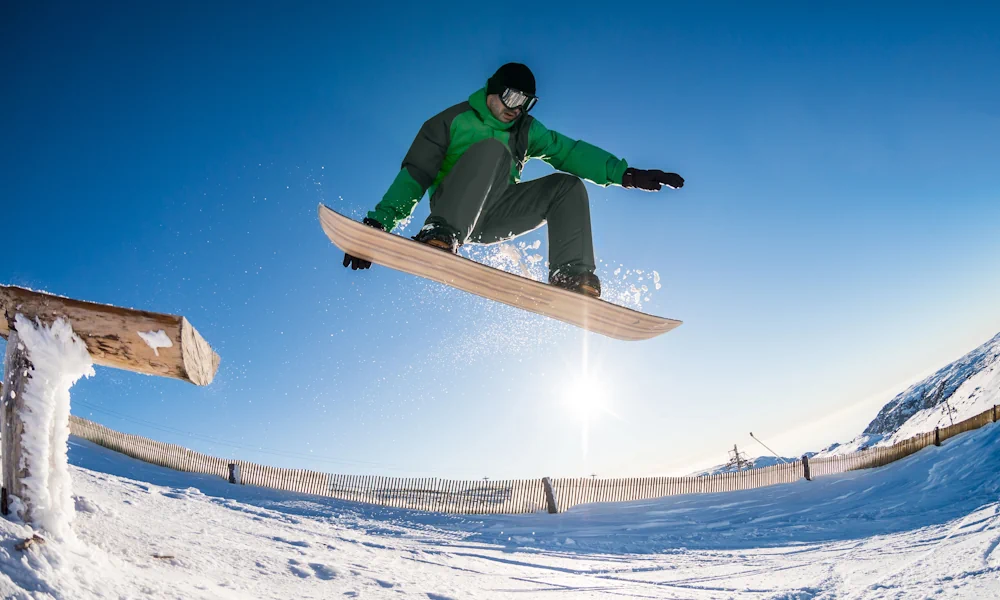Snowboarding vs skiing - what is preferable?
Going down a slope with sparkling snow is one of the most wonderful feelings there is, and some prefer doing it on skis and some on snowboards. Some years ago, when I learned to ski, snowboarding did not really exist as an option, so there was no question about what to choose. Today, snowboarding is almost as big as skiing, at least among younger riders.So, if you are coming along on a ski trip this winter for the first time, what is actually preferable to learn if you want to be able to get down the slopes yourself? Here we will go through both "styles" and compare them, all to help you decide whether you should focus on learning skiing or snowboarding.
To begin with, we should mention that both sports, skiing and snowboarding, have their unique charm, but each sport also has its own challenges to consider. Both have their thrilling moments, they are both physically demanding, and above all - both are incredibly fun. But they also have their challenges that some see as advantages while others might see them as disadvantages, and how you feel about these thigs is something that can be crucial for what you ultimately prefer.

The learning curve for the different styles
One of the first things people think about is the learning curve, that is, how quickly can you go from your first stumbling "steps" in your new equipment to ride down the hills somewhat smoothly, so we start there.Skiing - easier at the beginning
Generally, it is said that skiing is a bit easier for beginners, and this is true at least when we talk about the initial learning period. The position, or stance if you will, where you face forward and your feet are slightly apart feels more natural for most, especially if you have practiced other sports with similar characteristics such as cross-country skiing. It is also easier to maintain balance when you are standing on a pair of skis, which makes it feel less intimidating when you glide down the slopes for the first time.However, there is a catch. Although it is a relatively quick curve to learn the basics, it can be harder to progress from a happy beginner to more advanced levels. Skiing requires technical skills, especially when the slopes start to get a bit steeper and tighter turns are required. And even more so if we talk about off-piste skiing, but all of this is a bit further down the line and not something to think about initially.
To truly master skiing, you need to become comfortable with balance, turns, edge control, carving, and how to use the poles as aids. All of this should not only be learned separately, but everything should also come together in "perfect" coordination - and getting all of this right take's time.
Snowboarding - harder at the beginning
Learning to snowboard is often harder to pick up at the beginning. Having your feet strapped to a board, with no ability to move them, combined with standing sideways is something that feels very unfamiliar and even confusing. If you are skilled at skateboarding or surfing, you have a huge advantage. True, your feet are not strapped in these two sports, but the stance is the same and the movements to maintain balance are similar.The first days with snowboarding usually involve many falls, either backward onto your butt and in the worst case your back, or forward with high pressure on your hands and wrists. Trust me - getting a few bruises is inevitable, and you need to master the fear of falling. Personally, I hit my back hard on the first day I learned to snowboard, which made me terrified of falling backward for several hours afterward, and this naturally caused me to fall forward all the time instead. Maximizing the amount of protection on your body in the first days is recommended, as this not only prevents injuries but also helps you keep the fear of falling under control.
But once the basics are in place, it is easier to continue your development towards being able to say that you "master snowboarding". In fact, snowboarding is very intuitive once you get the hang of it, and I would say that the curve to reach a level where you can call yourself a competent rider levels out much faster compared to skiing.
Control and comfort
As the next step, we take a closer look at control and comfort for the different styles, and what distinguishes them.Skiing - more control
As a skier, you have the feeling that you have more control. Even though it almost feels impossible with the interplay of feet, hands, and centre of gravity at the beginning, you still have the feeling that you are not "strapped in" but completely free to move. The ability to use both skis as support makes it easier to adjust your movements to maintain balance, and having poles in your hands also naturally helps with stability.A major disadvantage of ski equipment is the ski boots. They are known to be uncomfortable, especially when you must walk in them, and they are not very fun to stand in at après-ski when you are tired after a day on the slopes. Ski boots are heavy, stiff, and rigid, and it takes time to get used to them. But remember that even though they sometimes feel like a torture, it is the boots that give you the control and support to maintain balance on the slopes, so they are very important to you.

Snowboarding - more flow
Snowboarding is largely about flow. It feels like you are surfing on the snow, and the turns feel less jerky compared to skiing. You will soon discover that snowboards work excellently in powder snow, which is harder with skis as they tend to get stuck in the snow if you do not master the technique, and the feeling of gliding over fresh snow on a board is hard to beat.However, the flow is not just a positive aspect; it comes with a lack of precision. As a snowboarder, you have a harder time on icy slopes, and in steep areas it can be difficult to do the turns that are required to brake, and short turns like narrow trails requires are more challenging. Sometimes it may require you to simply take off your board and walk.
Additionally, it can be a bit tricky to get on and off some lifts as a snowboarder, especially for beginners. To make this easier, you will need to strap on and off your bindings a lot, which can feel cumbersome at times.
But a big advantage of snowboarding is the boots. Snowboard boots are much more comfortable than ski boots and feel almost like a nice boot. They are soft, easy to walk in, and generally make life in and out of the ski slopes more comfortable. When you walk from the hotel to the lifts or stand and have a beer at après-ski in a pair of comfortable snowboard boots, it will definitely feel like you made the right choice.
Injuries - what is the most dangerous?
Injuring oneself is certainly not something anyone wishes for, but since skiing and snowboarding are very physical sports (and can even be called extreme sports if you ask insurance companies), we must naturally go over the injury risks. However, it should be mentioned that serious injuries are not something that happens frequently. As long as you are aware of your limitations, adapt accordingly, and do not become overconfident, injuries are not something you should walk around worrying about.Skiing - knees in the danger zone
Knee injuries are much more common with skiing compared to snowboarding. The movement of the legs, independent of each other, and the twisting motion involved in turns can put a very high strain on your knees, especially if you fall when your body is in the wrong position. Twisting and injuring the ligaments is unfortunately something that happens to some skiers.Snowboarding - upper body in the danger zone
When we talk about snowboarding, there tends to be more injuries to the upper body compared to skiing. Since beginners often fall forward or backward, wrist fractures as well as back and shoulder injuries are much more common. Wearing the right protective gear is very important, especially for beginners, and therefore wrist guards are a must when snowboarding, and a back protector is also recommended.In common for both skiing and snowboarding
When I started skiing as a child in the 80s, helmets were not very common, especially not among adults, where it was almost non-existent. Today, it is something that almost everyone has. Even though it is generally only mandatory for children (in some countries, parents can even be fined if their children do not wear helmets), it is something that even most adults use today.The reason to wear a helmet is simple - head injuries exist and can cause lifelong damage or even be fatal. Anyone who knows about the case of Michael Schumacher is aware of this. As a beginner, wearing a helmet is simply a must, but even when you master your skiing style better, it is worth keeping it on - safety first, right?
Terrain preferences
Your choice of whether you prefer skiing or snowboarding may also depend on the type of terrain you prefer, or think you will prefer, to ride in.Skiing gives you versatility
If you choose to go for skis, you gain the advantage of being able to choose to ride in more varied terrain. Whether it is about powder snow, groomed slopes, moguls, or skiing through narrow forest areas, skiing gives you the control and balance needed to handle all these types of terrains and conditions. Of course, we are talking about long-term goals for certain terrains; for a beginner, it is best to stay on the simple groomed slopes.Snowboarders love powder snow
On the other hand, when it comes to snowboarding, it gives a fantastic feeling to glide through powder snow. If you are lucky enough to experience a day with freshly fallen snow, snowboarding offers an almost surreal experience; it will feel like you are floating on air.But snowboarding can be more complicated on flatter terrain, such as transport stretches between slopes. If you ride over a long flat stretch, you sometimes have to take off your bindings and push with your foot to move forward, while skiers can easily glide or skate through the same area.

If you are interested in learning various tricks, which of course is total overkill for beginners but can be something that is a future goal, snowboarding is probably what you want to focus on. Many snow parks, with their rails, jumps, and halfpipes, are often designed with snowboarders in mind.
Why do people love one more than the other?
Both skiing and snowboarding have their charm and excitement, and even for those who master both, there is always something they prefer over the other.Skiers love precision and speed
Skiers are generally drawn to speed and control. If you love to completely fly down a mountain while having the ability to make sharp turns and navigate through narrow passages, skiing can be the ultimate adrenaline rush. Additionally, ski equipment is focused on precision and control. Skiers also appreciate the ability to handle a wide range of terrain, which allows them to easily (well, sort of) get around everywhere on the mountain.Snowboarders love the flow and freestyle element
Snowboarding is all about the ride itself. Snowboarders love the flow when carving through turns and the feeling of gliding over the snow. Many also start snowboarding for the freestyle aspect - the ability to jump, do tricks, and spend days in the snow park is a big draw for some. Snowboard culture is also seen as more relaxed and a bit more "hip" than skiing, but this is of course a purely subjective opinion (often among youth).So, what should you choose?
What you choose simply depends on what you want to get out of your time on the mountain. Both skiing and snowboarding have their charm and their advantages and disadvantages. So why not just try both, you might wonder? Of course, you can do that, but keep in mind that you need to give each sport/style a few days to learn it well enough to get an honest impression of whether you like it or not.So what do I personally prefer? It was skiing that I learned first, it is what I master best, and maybe that's why I also like it the most. I have no problems with any terrain, and I really love the speed of skiing, often on the edge of what feels uncomfortable without being dangerous. Learning to snowboard was, however, an incredibly fun experience, even though I bruised myself black and blue while learning it. When I really felt that I could master a snowboard, it was a wonderful feeling, and I love to sometimes swap my skis for a snowboard for a day.
Written by:
My name is Robert Lundgren, I am Swedish and was born in the mid-70s and learned to ski downhill from an early age and have since skied regularly every winter throughout my life. I wouldn't call myself an expert skier, but I maintain a high "amateur level" and have tried most things in skiing around the world. Even though I primarily see myself as a "skier", I also love snowboarding and try to snowboard at least one day on every ski trip, partly because it's fun, partly to maintain my skills.
